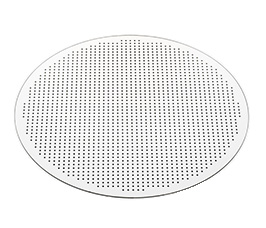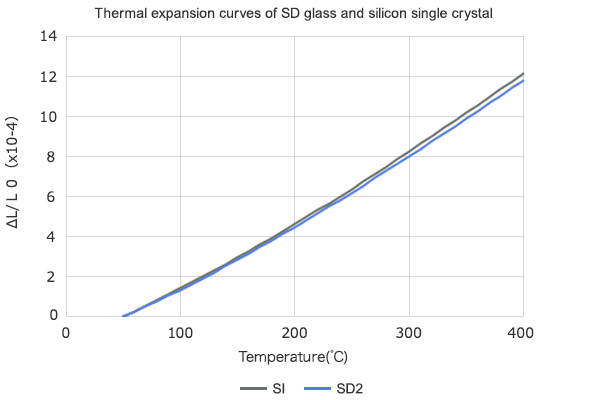
The thermal expansion characteristics of SD2 are matched with those of silicon single crystal. Therefore, anodic bonding with little distortion can be performed over a wide temperature range.
- Matching thermal expansion characteristics with silicon single crystal
By carefully selecting the glass composition of aluminosilicate type (SiO2-Al2O3-Na2O type), the thermal expansion was matched with that of silicon single crystal over a wide temperature range. - Easy anodic bonding
The volume resistivity is reduced by adding a small amount of Na. This results in a glass composition that can perform strong bonding even at temperatures of 400 °C or lower. - Stable quality
The variation in the thermal expansion characteristics between production lots is very small and stable. - Easy to process
SD2 can be etched with low concentration hydrofluoric acid aqueous solution, and the etched surface becomes a mirror like surface.

- Semiconductor pressure sensor substrate
- Acceleration sensor substrate
- Nozzle part of inkjet printer
- Glass for micro-machining bonding
| Property | Unit | Value | Remarks |
|---|---|---|---|
| Thermal Properties | |||
| Coefficient of Thermal Expansion | x10-7/°C | 32 | 30~300°C (thermal expansion meter) |
| x10-7/°C | 33 | 30~350°C (thermal expansion meter) | |
| x10-7/°C | 34 | 30~400°C (thermal expansion meter) | |
| x10-7/°C | 35 | 30~450°C (thermal expansion meter) | |
| x10-7/°C | 36 | 30~500°C (thermal expansion meter) | |
| Strain Point | °C | 670 | 1014.5 poise |
| Transformation (Tg) | °C | 720 | |
| Sag Point (Ts) | °C | 785 | |
| Mechanical Properties | |||
| Specific Gravity | 2.6 | ||
| Young’s Modulus | GPa | 87 | |
| Modulus of Rigidity | GPa | 35 | |
| Poisson’s Ratio | 0.24 | ||
| Knoop Hardness | 638 | ||
| Abrasion Factor | 44 | ||
| Chemical Resistance | |||
| HN03 Resistance | mg/cm2 | 0.08 | *1 |
| H2S04 Resistance | mg/cm2 | <0.01 | *2 |
| NaOH Resistance | mg/cm2 | <0.01 | *3 |
| Optical Properties | |||
| Refractive Index | (Nd) | 1.531 | |
| Abbe-number | (νd) | 59 | |
| Electrical Properties | |||
| Dielectric Loss | (tanδ) | 0.010 | 20°C 1MHz |
| (tanδ) | 0.019 | 100°C 1MHz | |
| (tanδ) | 0.049 | 200°C 1MHz | |
| Dielectric Coefficient | 6 | 20°C 1MHz | |
| 7 | 100°C 1MHz | ||
| 7 | 200°C 1MHz | ||
| Volume Resistivity | x1012Ω・m | 4.1 | 20°C DC500V 1 minute |
| x1012Ω・m | 0.4 | 100°C DC500V 1 minute | |
| x1012Ω・m | 3.8 | 200°C DC500V 1 minute | |
*1 Indicates weight reduction in mg/cm2 per unit area when polished glass sample of 43.7 mm diameter (30 cm2 on both sides) and 5 mm in thickness was immersed in well stirred 80 °C 30% HNO3 aqueous solution for 50 hours.
*2 Indicates weight reduction in mg/cm2 per unit area when polished glass sample of 43.7 mm diameter (30 cm2 on both sides) and 5 mm in thickness was immersed in well-stirred 80 °C. H2SO4: HNO3:H2O = 1:1:1 aqueous solution for 50 hours.
*3 Indicates weight reduction in mg/cm2 per unit area when polished glass sample of 43.7 mm diameter (30 cm2 on both sides) and 5 mm in thickness was immersed in well-stirred 50°C. 0.00N NaOH aqueous solution for 15 hours.

